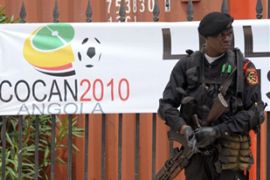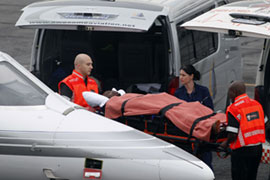Togo team attack suspects arrested
Two suspects arrested in Angola over lethal ambush of Togo’s national football team.

“In war, anything can happen, this is only the beginning,” Rodrigues Mingas, who calls himself the group’s leader, told France-Info radio.
Attack details
The Togolese team was driving to Angola to take part in the African Cup of Nations tournament when gunmen opened fire on the bus Friday.
Togo’s assistant coach and team spokesman were killed, as was the Angolan bus driver. Eight were wounded, including a goalkeeper flown to South Africa for treatment.
Players reluctantly left Angola late on Sunday. They had said they wanted to compete to honour the dead, but their government dispatched the presidential plane after saying it was not safe to stay.
Gilbert Houngbo, Togo’s prime minister, said Angola had not done enough to protect the team after the attack in Cabinda, an oil-rich region that has seen occasional separatist violence.
Separatist divisions
Mingas, who calls himself the leader of the Front for the Liberation of the Enclave of Cabinda forces, or FLEC, said Monday his group was behind the attack.
 |
| Three people were killed and eight wounded in the attack in Cabinda on Friday [REUTERS] |
But another official in Cabinda has denied that FLEC forces were behind the ambush. In a telephone interview with the AP on Sunday, Tiburcio Tati Tchingobo said his group had no objection to the tournament, even with play in Cabinda.
“The tournament can go on, but we are worried about security. We don’t have any problem with our fellow African brothers,” said Tchingobo, minister of defence in the self-declared Federal State of Cabinda, when reached on a satellite phone number.
The conflicting reports could stem from divisions among pro-independence groups in Cabinda.
Several claim the name FLEC. Cabinda’s armed groups have been weakened by the factional fighting.
New image failure
But periodic announcements from the Angolan government that the Cabinda uprising has been quelled – either by force or negotiations – have been followed by new outbreaks of violence.
The Angolan government has denied charges from international human rights groups that its military has committed atrocities in Cabinda. In Sunday’s exclusive interview with the AP, Tchingobo said he feared the attack on the Togolese team would spark a crackdown by Angolan forces in Cabinda after the tournament ends.
Angola has been struggling to climb back from decades of violence, and its government was banking on the tournament as a chance to show the world it was on the way to recovery.
Cabinda’s unrest is unrelated to – and often overshadowed by – a broader civil war that lasted nearly three decades and ended in 2002.